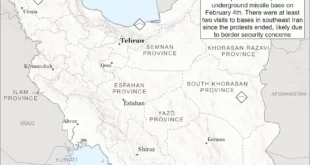 “We will submit our protest to the Danish and Finish Ambassadors to Tehran and will follow up on the case through diplomatic channels,” Hoseini added during his first weekly press conference here on Sunday.
“We will submit our protest to the Danish and Finish Ambassadors to Tehran and will follow up on the case through diplomatic channels,” Hoseini added during his first weekly press conference here on Sunday.
A number of Iranian MPs, in a written notification to Foreign Minister Manouchehr Mottaki here on Sunday, called for Tehran’s decisive and proper reaction to the Danish government.
The text which was recited by the Parliament Speaker, Gholam Ali Haddad Adel, called on Mottaki to protest to the Danish government for a new series of insults directed by the media of that country at the holy prophet of Islam (PBUH).
Elsewhere, he referred to the visit to the Middle-East by the US Secretary of State Condoleezza Rice, and pointed out that the tour is aimed at provoking anti-Iranian sentiments in the Arab world.
“Rice means to form an Arab front against Iran, Syria, Hamas and Hezbollah,” the diplomat continued, saying that the United States is seeking to reevaluate its policies in the Middle-East following the recent developments in the region.
Meantime, he said that the Middle-East nations are vigilant enough to avoid blind obedience of the US policies.
The spokesman further reminded that the visits to the Middle-East by the different US officials have always served to the detriment of the regional countries, and expressed the hope that Middle-Eastern states prevent aliens’ intervention in their affairs through friendship and cordial bonds.
In another part, he referred to the belligerent attitude of the Zionist regime and stated that violation of Lebanon’s airspace by the Israeli fighters is nothing new as aggression and invasion are typical of the Zionist regime.
“They seek to maintain the highest levels of military preparedness so that they can wage a new war whenever they need to,” Hoseini continued.
He also called on the different Palestinian groups, including Islamic Resistance Movement Hamas and Fatah Movement, to avoid differences, reminding that discord among Palestinians serves the interests of the Zionist regime.
The spokesman asked Palestinian groups to solve their problems through negotiations.
As regards Iran’s role in the reconstruction of Lebanon, he said that the Islamic Republic has taken some measures to help to the reconstruction of that country, but meantime, reminded that Zionist invasion of Lebanon has caused a real havoc which has left extensive destruction.
Hoseini said that the task could not be performed overnight, adding, “The reconstruction of Lebanon, rather, requires different plans and projects which must be devised and put into effect in cooperation and coordination with the Lebanese government.
Asked if the terrorist agent who murdered Iranian diplomats in London in 1982 has been released from prison, he said that following the Iranian Foreign Ministry’s protest to Britain, British government has stated that the said individual has not been set free and is still incarcerated even though his 23-year- long term is now over.
Touching on Iran’s nuclear issue, Hoseini said that President Ahmadinejad’s statements have been misinterpreted, and asserted, ” Mr. Ahmadinejad only meant that in case fair and just conditions are provided in the course of talks, Iran would discuss suspension of its uranium enrichment activities during negotiations. He did not at all mean that Iran would accept suspension of its nuclear activities under the said conditions.”
Iran’s new Foreign Ministry spokesman Seyed Mohammad Ali Hoseini dismissed the possibility for the suspension of enrichment activities by Tehran.
Hoseini noted that the senior officials of the Islamic Republic of Iran have frequently declared that Tehran may never suspend its uranium enrichment activities.
The official dismissed earlier reports by the Media about a short-term or 90-day suspension of enrichment by Iran, and said that the idea has no room in Iran’s peaceful nuclear policy.
In response to a question about the possibility of imposing sanctions against Iran, he said that Iranian officials and people always consider sanction as an obsolete tool and that the nation is used to such sanctions and threats.
The spokesman said that sanctions would leave their impact on both sides, adding that both sides would be subject to loss.
He stressed that Iran is not keen on those solutions which might end in sanctions, but meantime stressed that Tehran will continue with its nuclear activities.
“As President Mahmoud Ahmadinejad has underlined, Iran will not even accept a day long suspension,” the diplomat stated.
The Foreign Ministry Spokesman repeated Iran’s preparedness to hold talks on the nuclear issue without any preconditions and within the boundaries of the international laws.
He also stressed that the good will Iran has constantly displayed in its nuclear talks with the west proves that the Islamic Republic is seeking to solve the issue through peaceful means.
Describing the recent talks between Iran’s top nuclear negotiator Ali Larijani and the European Union Foreign Policy Chief Javier Solana as constructive and progressive, the spokesman said that the two sides have not yet decided about the setting of their next meeting, but meantime stated that the next Larijani-Solana meeting would be held after the London meeting.
Regarding Tehran’s offer for the formation of a nuclear consortium, the official reiterated that the plan is not restricted to any given country, and said that no decisive decision has yet been made about the parties which are to join plan.
“However, the gravest sanction is one raised by a government to deprive the nation of its natural right to access nuclear energy for peaceful purposes.
 Eurasia Press & News
Eurasia Press & News



